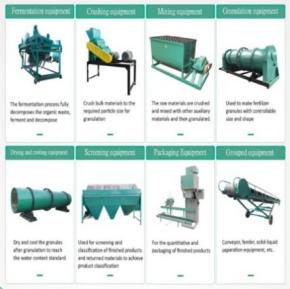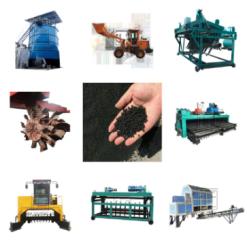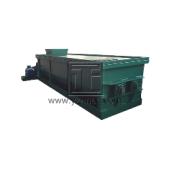Compost turners
Compost turners are specialized equipment designed to enhance the composting process by promoting aeration, mixing, and the breakdown of organic materials. These machines play a crucial role in large-scale composting operations, improving efficiency and producing high-quality compost.
Types of Compost Turners:
Tow-Behind Compost Turners:
Tow-behind compost turners are designed to be towed by a tractor or other suitable vehicle. These turners consist of a series of paddles or augers that rotate through the compost windrows, effectively mixing and aerating the materials. Tow-behind turners are ideal for large-scale composting operations where windrows can span long distances.
Self-Propelled Compost Turners:
Self-propelled compost turners are equipped with their own engines and drive systems, allowing them to move independently through the compost windrows. These turners offer greater mobility and maneuverability, making them suitable for smaller-scale operations or sites with limited access for larger equipment.
Wheel-Type Compost Turners:
Wheel-type compost turners are designed with a series of rotating wheels or drums that traverse the compost windrows. As the machine moves forward, the wheels or drums mix and aerate the materials. Wheel-type turners are known for their efficiency in thoroughly blending the compost pile.
Elevating Face Compost Turners:
Elevating face compost turners are specifically designed for composting in closed structures, such as tunnels or compost bays. These turners feature a conveyor belt system that lifts and flips the compost, exposing new material to the surface. This method ensures consistent aeration and mixing, even in enclosed environments.
Applications of Compost Turners:
Municipal and Commercial Composting:
Compost turners are widely used in municipal composting facilities and commercial composting operations. These machines efficiently mix and aerate the compost windrows, accelerating the decomposition process and producing high-quality compost suitable for various applications, including landscaping, agriculture, and soil improvement projects.
Agricultural and Farming Operations:
Compost turners are valuable tools in agricultural and farming operations. They can effectively compost a variety of organic materials, including crop residues, manure, and agricultural by-products. The resulting compost can be used as a soil amendment, enhancing soil fertility, improving nutrient content, and promoting sustainable farming practices.
Landscaping and Soil Remediation:
Compost turners find applications in landscaping and soil remediation projects. They are used to compost green waste, tree trimmings, and other organic materials, producing high-quality compost that can be applied to lawns, gardens, and degraded soils. The compost improves soil structure, enhances water retention, and promotes plant growth.
Waste Management and Recycling:
Compost turners play a vital role in waste management and recycling efforts. They can process organic waste streams, such as food waste, yard trimmings, and paper waste, diverting them from landfills and converting them into valuable compost. Composting reduces waste volume, mitigates greenhouse gas emissions, and contributes to a circular economy.
Conclusion:
Compost turners are essential machines for enhancing composting efficiency and producing high-quality compost. The different types of compost turners available cater to various scales of composting operations and specific site requirements. Municipal composting facilities, commercial composting operations, agricultural operations, landscaping projects, and waste management initiatives all benefit from the use of compost turners. By effectively mixing, aerating, and promoting decomposition, these machines contribute to sustainable waste management practices, soil fertility improvement, and the production of nutrient-rich compost.








